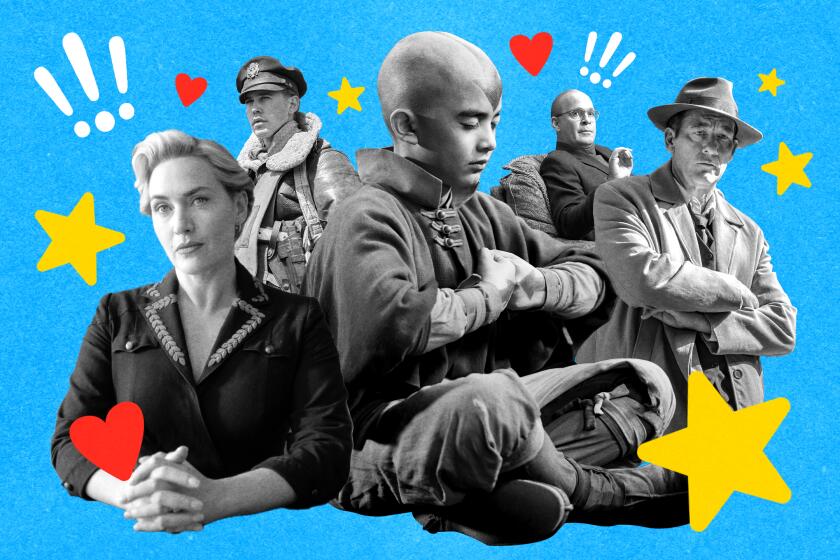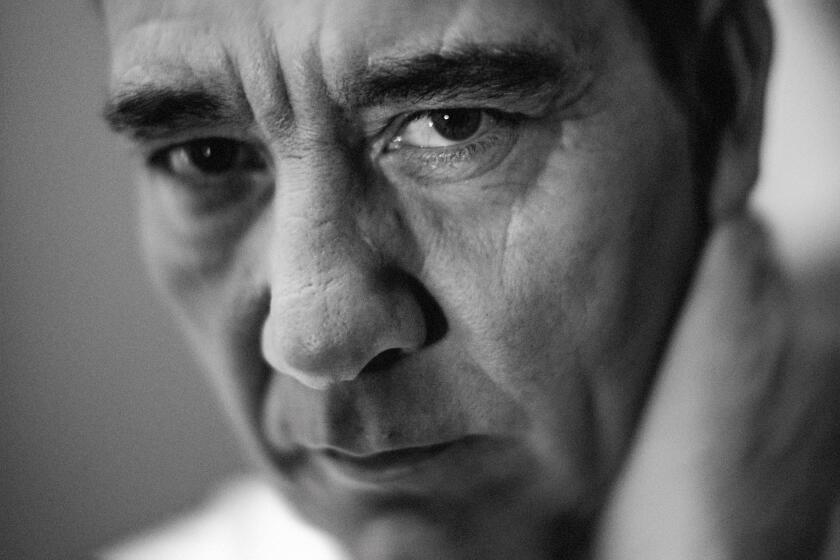Hollywood has been on a mystery binge. Now, pick a murder of your choice

- Share via
The mystery story is a relatively recent innovation, whether dated from Edgar Allan Poe’s 1841 short story “Murders in the Rue Morgue,” with its amateur detective C. Auguste Dupin, or Wilkie Collins’ 1868 novel “The Moonstone,” which established many of the conventions still in use today, or even the 1887 debut of Sherlock Holmes, so popular that his creator, Arthur Conan Doyle, could not kill him. But the form has made up for lost time, with mystery series filling entire bookstores and invading every other storytelling platform — theater, film, radio and perhaps most prolifically, television, where it has held fast while other genres have come and gone. It’s fantastically adaptable. Comedy, tragedy, cozy, gritty, formulaic, metafictional, historical, futuristic, highbrow, lowbrow, middle brow — something for every taste.
The advantage of a mystery, from a broadcaster or streamer’s perspective is that no matter the quality, viewers, once even a little invested, will stick around until the end just to find out who did it, or how they did it, or why they did it, even though the solution may be the least interesting aspect of the tale; often, if not inevitably, it will be a version of something you have seen before, there being a relatively few reasons people kill one another, and ways to do it, and to establish a phony alibi. This doesn’t really matter much, because above all, a mystery is an armature on which to hang a bunch of distinct, disparate characters, without the necessity of character development. (Though that is certainly allowed.) And because in this world, familiarity counts as novelty.
We gathered together the TV experts at The Times to preview our most anticipated new and returning TV shows of 2024. Here are 14 to keep an eye out for.
Although the mystery is evergreen, we seem to be in a period of expansion. Why? The pop psychologist in me would suggest in a world without answers to crises in the near and the long term, they propose successful solutions, based on demonstrable facts, arrived at through human intelligence. Tension is released instead of ongoing. And villains typically, though not always, get their comeuppance.
The critic in me, on the other hand, would observe that in follow-the-leader Hollywood, success breeds imitation, or repetition. On the big screen we have lately had Rian Johnson‘s “Knives Out” and “Glass Onion” and Kenneth Branagh‘s Hercule Poirot adaptations. On television, we’ve seen “A Murder at the End of the World,” Agatha Christie for the 2020s; Natasha Lyonne’s “Columbo”-inspired “Poker Face” (created by Johnson); “Dark Winds,” set in the 1970s, starring Zahn McClarnon as a Navajo tribal police chief; the satirical yet tightly structured “The Afterparty,” with Tiffany Haddish as its eccentric gumshoe. Even “Wednesday” was a mystery story, with Charles Addams’ dour teen its dark Nancy Drew, played by Jenna Ortega. And the starry comedy “Only Murders in the Building” is getting a secondary airing on ABC — strike-related, but whatever — after three seasons on Hulu, with a fourth to come.
In the space of a single week, four prestige major mysteries of different flavors, each with its particular pleasures, have premiered or are about to. There is “Night Country,” the fourth season of “True Detective” (HBO, Sunday) — I would call it long-awaited, but I’m not sure anyone expected to see it again — set within a sunless Arctic Circle, with Jodie Foster and Kali Reis its philosophically contrary investigators; “Monsieur Spade” (AMC, Sunday), from Scott Frank (“The Queen’s Gambit”) and Tom Fontana (“Oz”), which finds Dashiell Hammett‘s detective, played by Clive Owen, living in the south of France two decades after “The Maltese Falcon”; the fanciful, oceangoing “Death and Other Details” (Hulu, Tuesday) with Mandy Patinkin as the “world’s greatest detective,” maybe; and “Criminal Record” (Apple+, now streaming), in which London police detectives Cush Jumbo and Peter Capaldi clash over a possible miscarriage of justice.
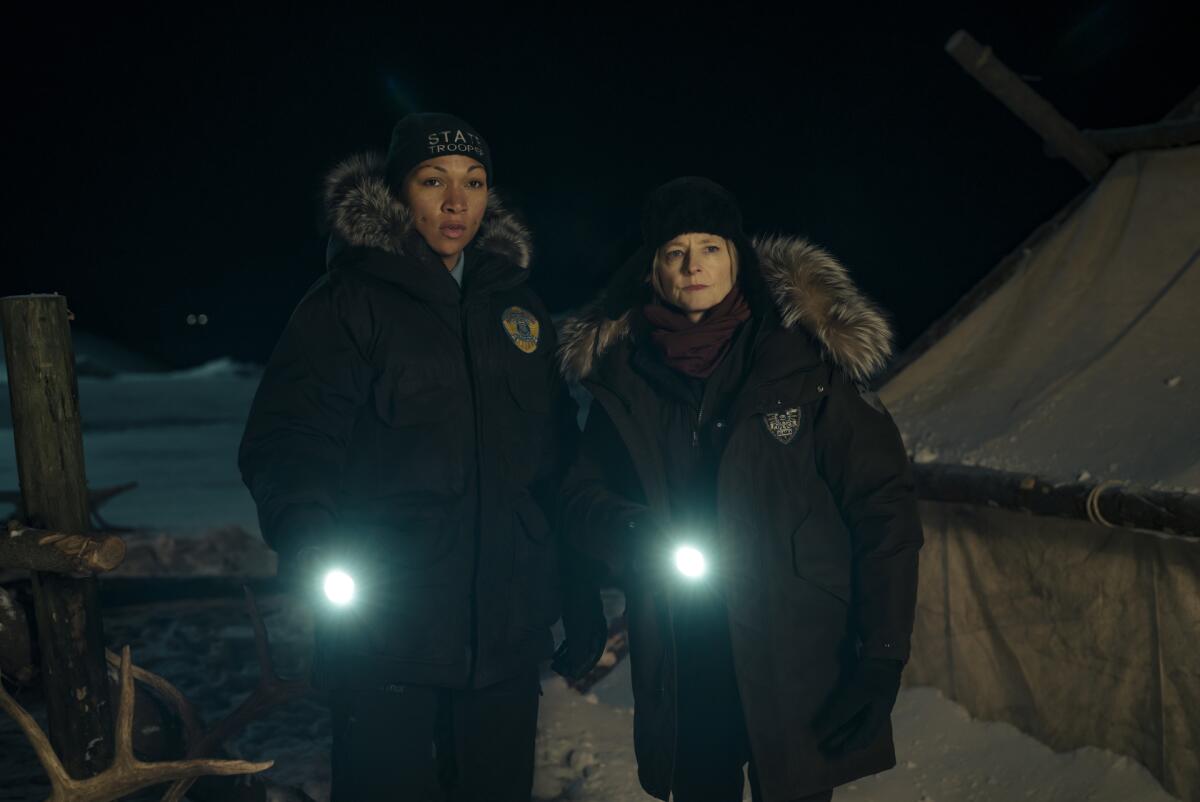
The excellent “True Detective: Night Country” leads this pack. The anthology series, created by the novelist Nic Pizzolatto, began as an HBO-brand elevation of the police procedural, a metaphysical whodunit in which the dialectical double act of Matthew McConaughey and Woody Harrelson, a refined version of the odd-coupling seen in “Beverly Hills Cop” and countless other cop adventures — was the real subject of the show, or in any case, the reason for its success. The current season, created, directed and mostly written by the Mexican writer and director Issa López (“Tigers Are Not Afraid”), seems fashioned to follow closely in the footsteps of the first, but now those footsteps are tracking through the snow.
There are the same scenes of the principals driving and talking and the presentation of differing points of view, one more empirical, one more spiritual. There is the recurring, sometimes chilling presence of a mysterious folk symbol, “older than the ice probably.” And there is one reference so specific that it can only be described as fan service.
Set in the fictional Alaskan small town of Ennis, the story begins on the day of the last sunset before night moves in for six months, and runs through Christmas and New Year’s. Snowbound crime shows are nothing new, but given the demands and costs of production, they are uncommon, and special. And there’s something beautifully unsettling about all the darkness surrounding this isolated town, an environment that, without the proper gear, will kill you, and where it always seems to be the same time of day, or night.
“Tigers Are Not Afraid” was a horror film shot through with magic realism, and both those elements find a home in “Night Country.” Indeed, it begins more like a horror movie than a crime show, with a herd of suddenly stampeding reindeer, and then a delivery man discovering that the scientists at a remote research station, whose exact business no one seems to know, have all disappeared, leaving the legend “WE ARE ALL DEAD” written on a white board. (There is no actual on-screen violence in the show, but plenty of shocking images and an ongoing sense of dread. (You breathe a sigh of relief whenever someone enters a space where the lights are on and people are around.)
A severed tongue discovered on the site seems to link the disappearance to the unsolved murder of an Indigenous midwife and activist. It piques the interest of trooper Evangeline Navarro (Reis), who brings her suspicions to Ennis police chief Liz Danvers (Foster). Navarro and Danvers, physical and philosophical opposites, though they share a consuming doggedness, have a lot of old business, which will be revealed through the season, and explain much — though not everything will be explained. Foster is every bit as good as anyone who has paid her the least bit of attention since the Disney days would expect her to be; but Reis, a boxer only recently turned actor, is terrific as well.
Echoing the investigators’ conversations about the living and the dead, God and the beyond, the show plays along the lines of the natural and the supernatural, without fully throwing in with either — it leaves some things mysterious and open to discussion; that Rose (Fiona Shaw), the local bohemian, actually sees her dead husband, is merely a fact in this world, but at the same time people do things for human reasons. This isn’t a story of demons.
Ennis is one of those small isolated communities where everyone knows everyone or knows someone who does, but at the same time is afflicted by a general air of loneliness and disconnection. Even as the investigation proceeds, by fits and starts, we are involved in various well-drawn (or sketched) family and relationship and community dramas. Danvers’ teenage stepdaughter (Isabella Star LaBlanc) wants to explore her Indigenous heritage, much to Danvers’ unexplained displeasure; deputy Peter Prior (Finn Bennett) is devoted to his boss and his job to the point of endangering his marriage, and his relationship with his underling policeman father (John Hawkes); Navarro’s younger sister Julia (Aka Niviâna) has mental health issues. And this is certainly not the first mystery story in which corporate interests — the local mine — are set against the needs of the people. (See: “Dark Winds.”) It has political resonance, but it’s also the most commonplace element in a largely extraordinary series.
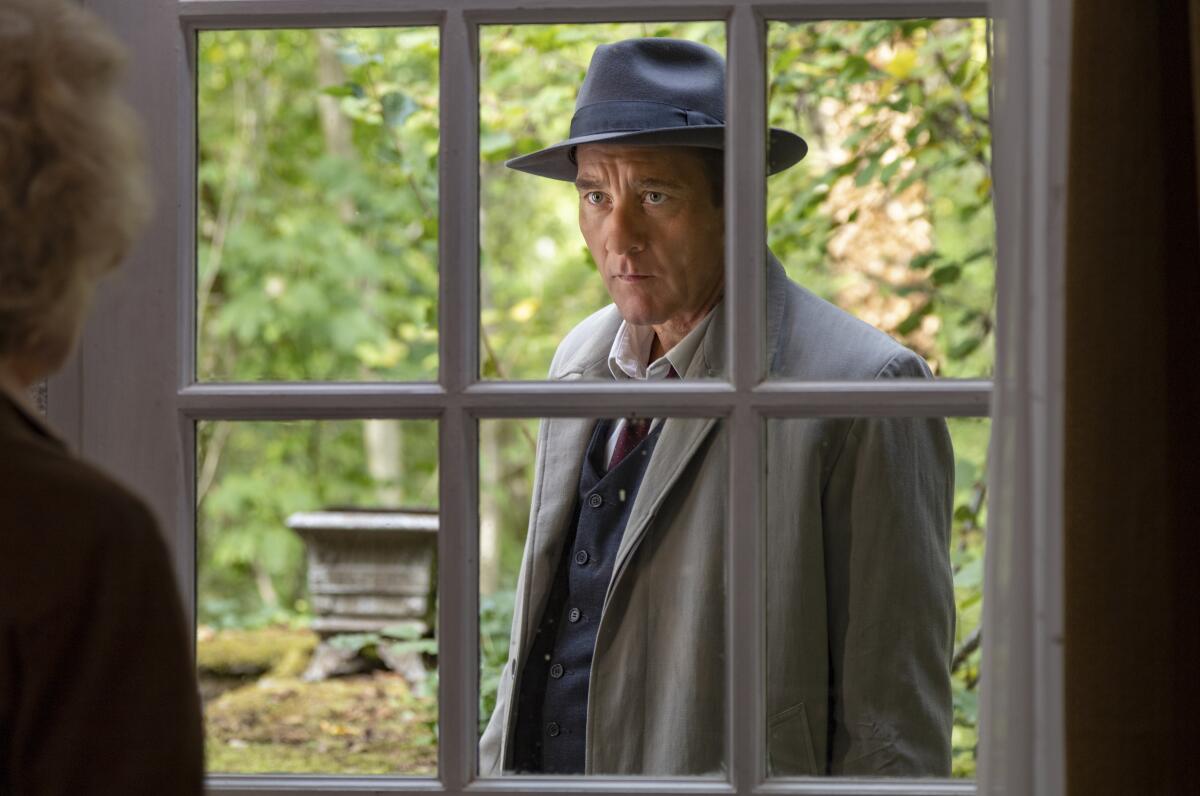
“Monsieur Spade” begins in the mid-1950s, as the San Francisco detective attempts to deliver the daughter of the late Brigid O’Shaughnessy — the femme fatale Spade delivers to justice at the end of the “The Maltese Falcon,” who, in this world, has subsequently gone free and later died — to her father in a small town in the south of France. The story then jumps ahead into the early 1960s; Spade, who has traded his suit and fedora for polo shirts and sunglasses, is now a French-speaking, amiable member of the community, a rich widower who fills his bags at the farmers market, pets local dogs and swims naked in his swimming pool. Teresa (Cara Bossom), the daughter, is a sullen, clever, dangerously independent teenager living in a convent, where Spade pays for her keep. And then things get nutty, with six murdered nuns, a mad monk and an Algerian golden child over whom various parties fight for possession. (The Algerian War has recently concluded, and it’s an issue here.)
In AMC’s ‘Monsieur Spade,’ the British actor Clive Owen plays detective Sam Spade 20 years after the events of ‘The Maltese Falcon.’ Humphrey Bogart, who played the character in 1941, was inspiration.
Owen is the right age and shape and can do the accent, but it does seem odd not to have cast an American actor in this quintessentially American role. Unlike Raymond Chandler’s Philip Marlowe, and most every other literary detective, Spade’s fame is based on a single book and film, which makes Humphrey Bogart inseparable from the character, even as it’s unfair to reckon another actor against him. (It’s impossible to imagine Bogart submitting to a prostate examination on-screen, as Clive Owen does here, though that is, of course, the point.) Owen studied Bogart’s speech patterns for the role, but he lacks his music; his portrayal is oddly static, his delivery so dry as to be almost monotonal. His Spade is forever cracking wise, but few of his remarks register as funny, either to this viewer or his interlocutors. (“Do you know where the word ‘sabotage’ comes from?” “The dictionary.”) It occurred to me that this might be intentional, to signify his being a man out of his time or place, but that feels like overthinking; the effect in any case is to render the character oddly inert, as busy as the screenplay keeps him. Still, the angrier or more frustrated or active Spade grows, the more effective Owen becomes, which does pep up the later episodes.
And, as in “The Maltese Falcon,” he is only one of a colorful cast of characters, including an impressive Bossom, a very appealing Denis Ménochet as the local police chief, who merits a series of his own; Louise Bourgoin as Marguerite, a Juliette Gréco-esque singer with whom Spade co-owns a bar; and Matthew Beard and Rebecca Root as Spade’s new British neighbors who don’t seem for a moment to be who they claim and might loosely be termed the Sydney Greenstreet and Peter Lorre of the piece. Whatever the demerits of Owen’s performance, it isn’t fatal to an enjoyable series; he gets the job done, and is particularly good in his scenes with Bossom, whose Teresa he regards with paternal annoyance. And the series departs on a final shot and line so lovely it’s worth the getting there.
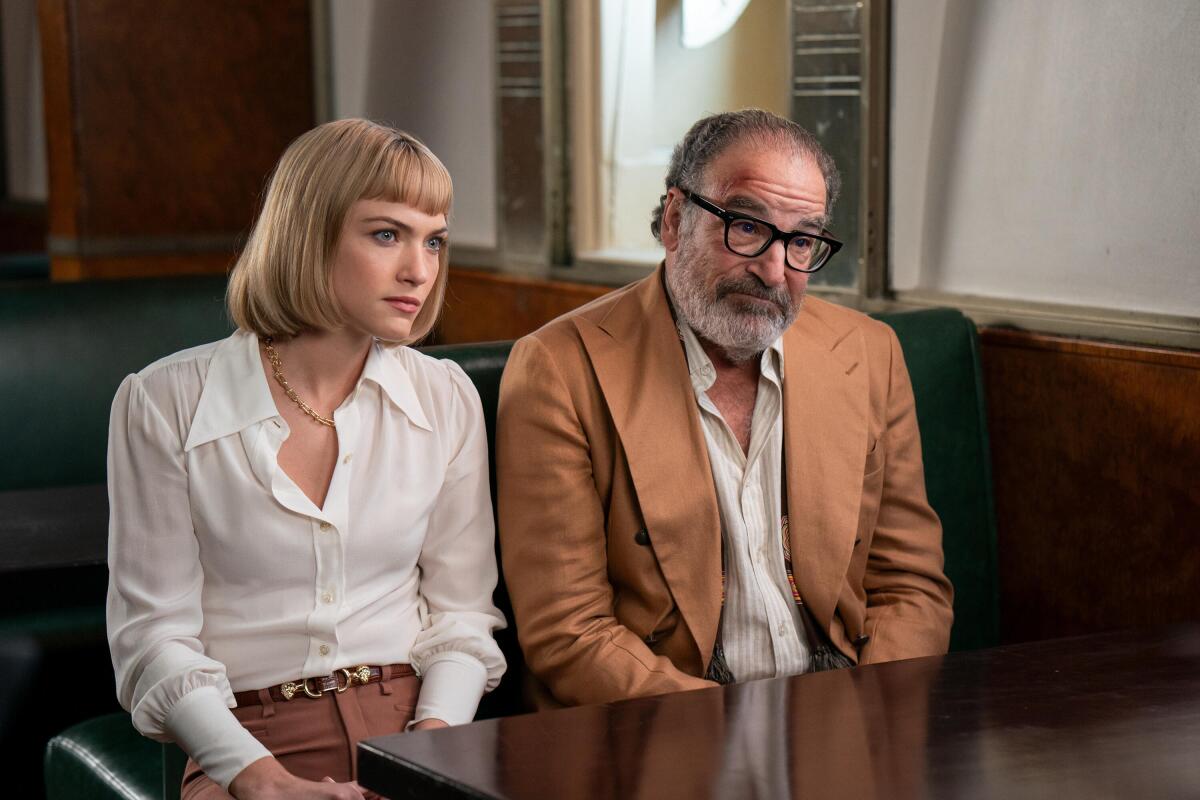
“Death and Other Details” is a Christie-style country house mystery in which the country house is a sort of bespoke ocean liner, chartered by the Collier family, who are using the occasion to pitch a business deal to Chinese investors, with whom various Colliers also have personal relationships. (It’s a cavalcade of personal relationships.) Among the travelers are Imogene Scott (Violett Beane), the Colliers’ ward, who as a child saw her mother blown up in a car in the Colliers’ driveway, and Rufus Cotesworth (Patinkin), a detective who reneged on his promise to the girl to find the killers. In the course of the series, the two will go, I don’t need to tell you, from adversaries to collaborators. There is a lot of hanky-panky going on among the main characters — the ship is filled with extras who have no influence on the story — and a little romance and a lot of relationship issues, which means you do not have to wait long for a sex scene. The series hops around a lot in time and memory — Rufus and Imogene appear as witnesses in one another’s flashbacks — and is not perfectly plausible, in big and little ways, but its energy and reveals upon reveals make that moot. Patinkin, in an indefinable accent, is his usual Big Presence, but Beane holds her own, and the arrival of Linda Emond as Interpol agent Hilde Eriksen pays constant comic dividends.
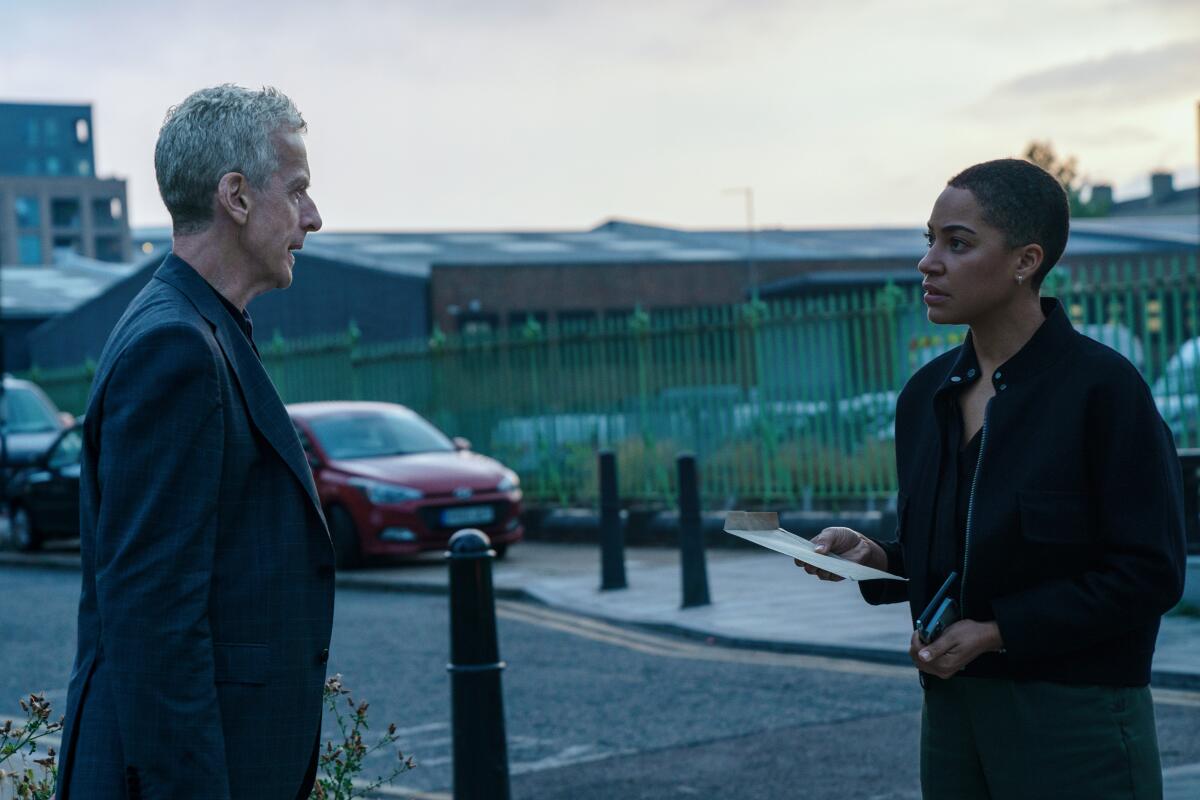
The absorbing “Criminal Record” takes us to modern-day London, and has that quality of crisp reality peculiar to British series (see also: “Slow Horses”); it’s not a documentary feel, but there are few layers of cinematic gloss separating the view from the viewed, and as a result one feels closer to the characters, the action and the environment. The locations are appropriate; the details of a police station and the institutional bureaucracy feel exactly right. The series has a persuasive immediacy.
The story begins with an anonymous call to the police from a woman, fearing for her life from a violent boyfriend, in the course of which she tells the operator that he’s claimed responsibility for a murder for which another man sits in prison. This falls into the lap of Detective Sergeant June Lenker (Jumbo), who runs with it farther than any of her associates would like, particularly the original investigator, Detective Chief Inspector Daniel Hegarty (Capaldi), a respected officer who clearly has something to hide and, remembering the case, describes the convicted Errol Matthis as “the poor man’s O.J.” (“Excuse me?” asks Lenker, to no response.) He’s calm and collected; she’s impulsive and impatient, with a tendency to alienate her colleagues, bend and break rules and a disinclination to wait for backup — support is always too many minutes away — charging into dangerous situations with sometimes bad results.
The narrative proceeds with the usual red herrings, flurries of action and suspense and unsuspected revelations, some of which are telegraphed long before the moment they’re meant to take us by surprise. Answers will be forthcoming, but, as with “True Detective,” the real mystery resides within individuals, and how they are with one another — not only the relationship between Lenker and Hegarty, working sometimes together, and sometimes against each other, but between parents and children and partners. And Capaldi and Jumbo work beautifully together. There’s no mystery in that.
More to Read
The complete guide to home viewing
Get Screen Gab for everything about the TV shows and streaming movies everyone’s talking about.
You may occasionally receive promotional content from the Los Angeles Times.

